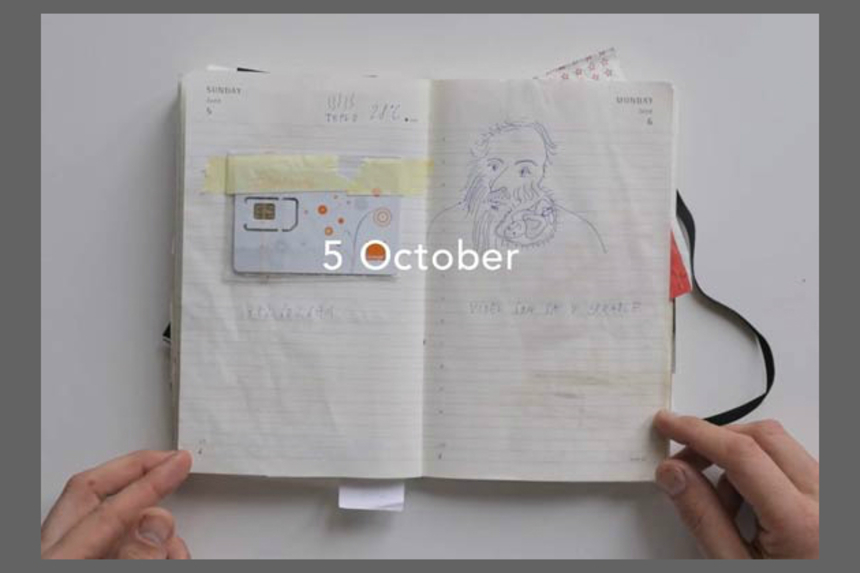Rotterdam 2016 Review: Personal Docupic 5 OCTOBER Tackles Modern Man And Transcendentalism

As a cinematographer, he has lensed the award-winning Slovakian documentaries Cooking History (2008) and docu-triptych Velvet Terrorists (2013). Besides photography and cinematography, he stands behind the camera not only as operator but as director. He made a short film Autoportrait (2012), as the title suggests about the obvious subject, even though he does not appear on the screen throughout the film. By letting others do the talking, not as much about himself as about themselves, he made what he calls "a generational film".
On the question of why he does not title his photographs, he replies, "My photos carry stories within them which are unfinished. Anybody can create whatever significance... on what he sees. I would call it a dialogue." The signature style of his photos transposes also onto his cinematography work in a slow-burning series of tightly framed tableaux bearing the internal drama within them.
Such was his latest effort, award-reaping film Koza (2015), directed by Ivan Ostrochovský (producer of 5 October), erasing the boundaries between reality and fiction, fiction and documentary, following a protagonist playing himself in a fictionalized story heavily influenced by his real-life fate.
"We started shooting [5 October] with my brother in the summer of 2013 at various locations across the globe, such as France, Belgium, Italy, the Balkans, Laos and Thailand," explains Kollár, adding, "We had been limited by the wait for his impending surgery, which would, logically, have terminated the shoot as well as the film's story." Elaborating deeply personal matter in his mid-length debut, the filmmaker follows his brother Ján for several months before a complicated surgery with 50/50 odds of surviving.
Kollár follows an unnerving subject through the observational lenses of a documentarian, despite a personal attachment that does not interfere in front of the camera. Eschewing the documentary convention of talking heads, 5 October is dialogue free, absolutely relying on images in a narrative mode and the form he describes as "an homage to film as a medium talking through pictures". Excerpts from the director´s brother´s diary frame individual vignettes, exposing the internal struggle, thoughts whirling in his mind, and the flow of the remaining time in a countdown fashion.
Tackling the scenario of what-would-you-do in a saccharin-free venture, he embarks on an "Easy Rider-like" bike journey his brother had always dreamt about, "examining fear and an attempt to come to peace with one´s inner self". Kollár´s thought-through frames replicate his photographic modus. While travelling through exotic locations, the filmmaker, who was his own lenser, never slips into a travelogue routine.
The personal story has a universal layer of a contemplation on life while facing one´s mortality, whilst at the same time tackling the notion of a modern man. In a directorial statement, he explained why his brother did not realize his dream journey until what may easily be his last months: "His mortgage, tax declarations, and everyday routines kept him from thinking straight".
The integral component of every tableaux, apart from the protagonist, is nature in a more important position than just an eye-candy backdrop. The theme of mortality is reflected in, at times, a pristine nature, peppered with digressions to lyrical imagery, which gradually contributes to the undercurrent of transcendentalism.
"I went to the woods because I wished to live deliberately, to front only the essential facts of life, and see if I could not learn what it had to teach, and not, when I came to die, discover that I had not lived. I did not wish to live what was not life, living is so dear; nor did I wish to practice resignation, unless it was quite necessary.
"I wanted to live deep and suck out all the marrow of life, to live so sturdily and Spartan-like as to put to rout all that was not life, to cut a broad swath and shave close, to drive life into a corner, and reduce it to its lowest terms, and, if it proved to be mean, why then to get the whole and genuine meanness of it, and publish its meanness to the world; or if it were sublime, to know it by experience, and be able to give a true account of it in my next excursion."
The lasting quote of the philosopher Henry David Thoreau, taken from his book Walden, or, Life in the Woods, could not better translate the vibrating intensity of the poetical biopic 5 October, encompassing a broader frame than one person´s wait for a surgery.

Do you feel this content is inappropriate or infringes upon your rights? Click here to report it, or see our DMCA policy.






